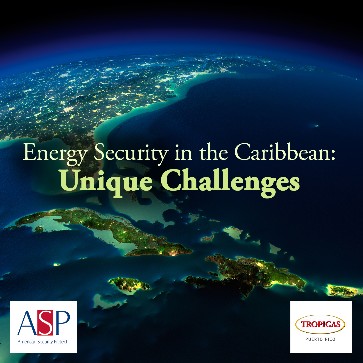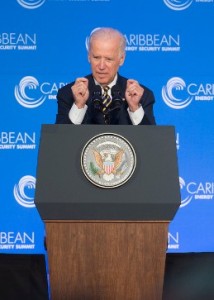
Obama, Biden, Kerry: Energy Security is Needed in the Caribbean
This post is cross-posted from Andrew Holland’s blog on Energy Trends Insider.
 For two decades, the United States has virtually ignored the geopolitics of the islands of the Caribbean: since the end of the Cold War, the region had changed from a playground of superpowers in America’s backyard to a place for vacations and little more.
For two decades, the United States has virtually ignored the geopolitics of the islands of the Caribbean: since the end of the Cold War, the region had changed from a playground of superpowers in America’s backyard to a place for vacations and little more.
Now, as I wrote in a previous column, geopolitics are bringing the US back to the Caribbean. The consequences of American inattention are clear: Venezuela stepped into the vacuum, providing cheap oil through its PetroCaribe program. In exchange, they received both tacit and overt support for Venezuela’s “Bolivarian Revolution” from Caribbean nations in international organizations like the Organization of American States and the United Nations. Even China, far on the other side of the Pacific, has increased its direct engagement with the Caribbean, as an increasing investor in energy producing countries like Trinidad and Tobago and in the much-discussed plans for a new canal across Nicaragua.
Today, with the Venezuelan economy collapsing due to mismanagement and low oil prices, there is a new vacuum – for the U.S. to step into.
The re-opening of official relations with Cuba will be a part of that, as are the imposition of sanctions by the U.S. on top Venezuelan security officials. American energy diplomacy is taking center stage, and the highest levels of the U.S. government are now engaged in this rebalance. In January, Vice President Biden hosted theCaribbean Energy Security Summit in Washington with leaders from across the Caribbean.
Secretary of State Kerry said in answer to a question at the Atlantic Council, about the geopolitics of energy and the collapsing price of oil: “If PetroCaribe were to fall because of events in Venezuela, we could end up with a serious humanitarian challenge in our near-neighborhood.”
He’s right. PetroCaribe, the subsidy program from Venezuela to select Caribbean countries, provides low-cost financing for these countries to buy fuel oil. In Jamaica, Haiti, and Nicaragua, these subsidies have added up to as much as 4% of GDP, and 10% of their government’s revenue. Ironically, these subsidies have not translated into cheap or reliable energy availability. In Jamaica, for instance, average electricity costs are about 33 cents per kWh (down from 38 cents in 2014), and the country ranks 112th globally for its power infrastructure. For comparison, electricity in Florida averages about 10 cents per kWh. PetroCaribe subsidies have been used by governments around the Caribbean for projects like bloated spending on infrastructure, acquisition of military hardware, unsecured development loans, or other spending not related to energy.
With Venezuela’s economy approaching collapse, it is not hard to see a case where the country’s leadership decides it would be easier to close the yawning budget deficit by reducing subsidies to foreign governments than to push more austerity on its own people.
This is why PetroCaribe is “More of a noose than lifeline” – while Venezuela can claim that it is an aid program to neighboring countries, it is a noose is around the neck – and if Venezuela were to withdraw the subsidies, the budgets and economies of many Caribbean countries would be left hanging.
On April 9 President Obama is scheduled to visit Jamaica to meet with Jamaican Prime Minister Portia Simpson-Miller and other CARICOM leaders. Energy security will be at the center of discussions.
All of this high-level attention to energy security issues is very important as oil prices have dropped to lows not seen in five years. This has reduced some of the short term financial incentives for countries to break their dependence on imported oil.
However, it is important for these countries to “fix the roof while the sun is shining” as Vice President Biden said at the Caribbean Energy Security Summit.
So, the leadership and the rhetoric is there, but are there actual ways of reducing energy security concerns in the Caribbean? In my next post on Caribbean energy, I will detail three ways that the US can help increase energy security, lower energy costs, reduce pollution and build international relations across the region, all with minimal costs to the American taxpayer.
ASP has written extensively on this issue. Read about the Caribbean Energy Security Conference last month, along with a full report.






[…] Obama, Biden, Kerry: Energy Security is Needed in the Caribbean Andrew Holland The attention to energy security issues in the Caribbean is very important as oil prices have dropped to lows not seen in five years. However, it is important for these countries to “fix the roof while the sun is shining” as Vice President Biden said at the Caribbean Energy Security Summit. […]
[…] approach to addressing the energy situation in the Caribbean is consistent with ASP’s Andrew Holland’s comments on energy security for the Caribbean, with the U.S. stepping in to fill the vacant shoes of […]
[…] Energy Security is needed in the Caribbean […]